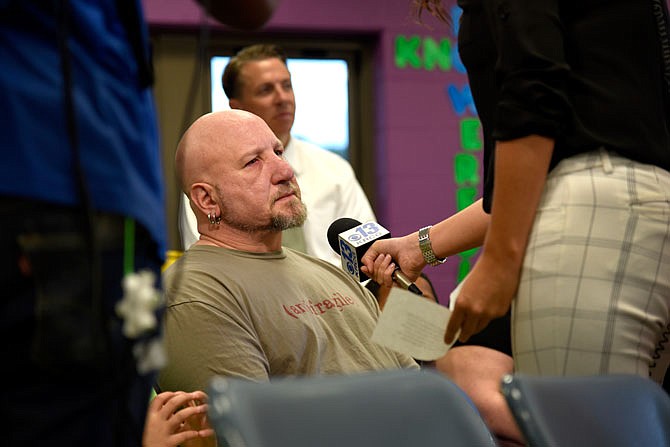While a few Jefferson City High School students said things have gotten better since their experiences in middle school, bullying remains a problem in area schools. The issue spurred a local campaign to stop it.
KRCG-TV held a "Stop Bullying Mid-MO" town hall community forum Thursday night at the Boys & Girls Club of Jefferson City.
A year ago, KRCG partnered with the United Way of Central Missouri to launch the Stop Bullying Mid-MO initiative - which includes regularly-scheduled stories about bullying that include interviews with representatives of agencies that deal directly with bullied individuals, according to a May story on the TV station's website.
The station Thursday did live interviews with local experts on bullying and anti-bullying measures: Joy Ledbetter, the family advocate and social worker at the Boys & Girls Club; Chad Rose, a College of Education professor at the University of Missouri and director of the Mizzou Ed Bully Prevention Lab; JCHS counselor Teshura Rogers; and Jefferson City Public Schools elementary counselor Ruthie Eichholz.
JCHS senior Da'Chanel Sutton and juniors Genesis Grinston and Joya Wheatfall-Melvin were also on camera.
"Bullying is not something I see a lot," Sutton told the News Tribune after the event about her experiences in high school - but that can never change the fact that in seventh grade, she lost a friend to suicide because of bullying.
However, Sutton added, she sees peers working together to stop bullying.
"The energy's changing," and it's less acceptable to be mean on social media, Wheatfall-Melvin said.
"As we get older, we mature," Grinston said about how things have changed since middle school.
Though bullying may have lessened to an extent, at least in those students' experiences, the Jefferson City Public Schools community is still concerned about it.
JCPS shared a school safety survey with its families in March, and of the 22 percent of the district's families who responded - more than half from the elementary level - bullying was their top concern.
JCPS Director of Quality Improvement Brenda Hatfield also shared in April a school safety survey, offered to faculty and staff at the same time as the family survey, also showed bullying was a major concern of the district's employees - one that produced "more than 100 ideas, programs and comments just about bullying" in the survey.
Data from the 2016 Missouri Department of Mental Health biannual Missouri Student Survey showed 32.4 percent of middle and high school students in Cole County who responded reported they had been bullied on school property in the last 12 months.
Answers to questions on the survey about students' behavior in the last three months also showed many students have been bullies themselves:
A majority of students - 64.6 percent - reported they had "made fun of other people."
More than 27 percent of students reported having "spread mean rumors or lies about other kids at school."
More than 20 percent of students said they had "posted something online or sent a text that might embarrass or hurt another student."
More than 13 percent of students "hit, shoved or pushed another student and (were) not fooling around."
"You could get bullied for being the smartest kid in the class," Sutton said of there not being a stereotype of who does or does not get bullied - it can be anybody.
JCPS Chief of Learing Brian Shindorf said Thursday if a family thinks their child is being bullied at school, they should inform someone at school immediately - ideally a counselor, teacher or principal.
Shindorf said the school is required to investigate within 48 hours to try to determine what's going on, though he added bullying is often difficult to prove because it happens in private, in isolation.
However, he said cyber-bullying is more likely to be documentable because of the electronic messages or images involved.
Shindorf said if a family or school thinks a child is being a bully, then the response is not just about disciplinary consequences but getting counselors involved to try to get at the root of the problem.
Grinston, Sutton and Wheatfall-Melvin - who last month organized a "Teen Town Hall" at the Boys & Girls Club about school safety and gun violence - said another such town hall about how students are working to reduce bullying would be beneficial.

